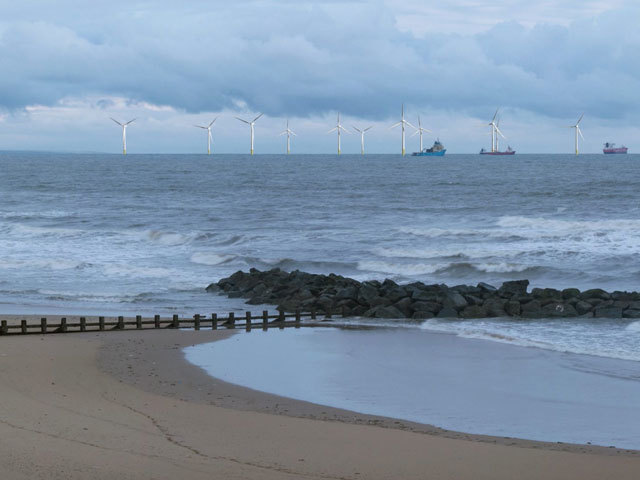
More than 4,000 jobs and £1billion of investment would be lost to the north-east economy if Donald Trump pulls the plug on his golf resort plans, a court heard yesterday.
The Court of Session heard that the US tycoon has threatened to halt the scheme – which includes a large hotel, holiday homes and a village – if a controversial windfarm development goes ahead off the Aberdeenshire coast.
Lawyers acting for the property billionaire are attempting to overturn the Scottish Government’s backing for the green energy project, claiming the decision was illegal.
He claims the 11-turbine European Offshore Wind Deployment Centre (EOWDC), which is 1.25 miles off Balmedie, will spoil the view from the luxury resort.
He has accused ministers of being biased, claiming they made up their minds to approve the project because it fits in with government policy.
Mr Trump’s counsel, Gordon Steele QC, told the court that the judicial review deserved the greatest possible scrutiny because of the implications.
In economic terms, the golf resort was “unprecedented”, representing a £1billion investment over seven years, he said.
The QC told the court, in Edinburgh, that the resort would provide between 4,000 and 5,000 jobs, including 1,500 to 2,000 during construction and 1,000 to 1,200 during operation.
Mr Steele said Mr Trump had several championship golf courses around the world and his desire for the Menie estate was to build the best in the world.
However, if the wind testing centre went ahead, Mr Trump planned to pull the plug, he said.
“This is no ordinary proposal,” Mr Steele said. “This is something unique.
“It requires the greatest possible attention and scrutiny in deciding whether or not all of that is to come to nothing, because it has been accepted that, if this windfarm development proceeds in its current location, this resort will not proceed and the economy of Scotland will suffer significantly.
“This is a matter of importance not simply to the Trump Organisation but is important to the nation.”
Earlier in the day, James Mure QC, making the Scottish Government’s case, said the consent catered for the “worst-case scenario” and the visual impact would be kept to a minimum.
But Mr Steele argued that the design proposal was unenforceable because, as a centre for testing wind technology, there was no set turbine design.
What was proposed was a “jumble of turbines of different sizes and dimensions” with different types of blades and sizes, possibly turning in different directions, he said.
“How can the minister say mitigation has taken place when he does not know what is being proposed?” Mr Steele said.
Mr Trump claims the decision not to hold a public inquiry breached his human rights.
However, Mr Mure said an inquiry would not have helped ministers reach a decision and ministers had given Mr Trump preferential treatment by extending the period for objections.
“It was reasonable for the ministers to take the view that a public inquiry would not assist ministers on the question of balancing and weighing up the policy interests,” he said.
Meanwhile, accusations made by Donald Trump over the granting of consent to the EOWDC were denied by the firm behind the project.
The Court of Session heard that Aberdeen Offshore Wind Farm Limited (AOWFL), a company set up for the project, had made a financial loss over the past seven years.
The company’s counsel, Douglas Armstrong QC, said that was not unusual and principal backer Vattenfall had pledged sufficient finance for the £240million project.
He said AOWFL had been open about its background and where the finances came from, 75% from Vattenfall and 25% from the Aberdeen Renewable Energy Group, which is financially supported by Aberdeen City Council and some EU funding.
Mr Armstrong attacked Mr Trump’s legal team’s argument that a generation licence should be a precursor to granting consent. The planning system did not put restrictions on applications, he said as it was possible to apply to run a public house without an alcohol licence.
Mr Trump’s counsel claimed that close contact between AOWFL and Marine Scotland could be construed as bias. But Mr Armstrong said the suggestion the applicant and Marine Scotland should be at arms-length was not consistent with the planning process.
The case before judge Lord Doherty is expected to end today.
